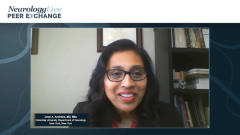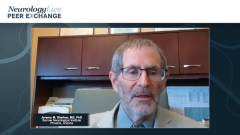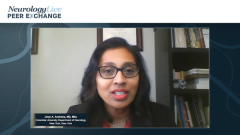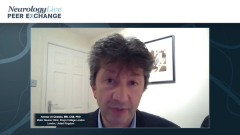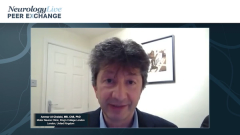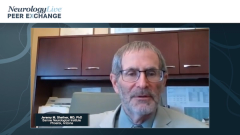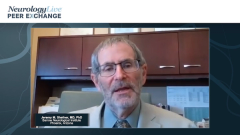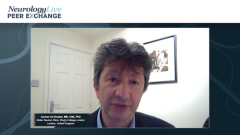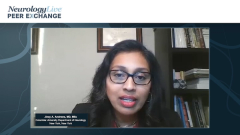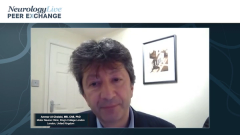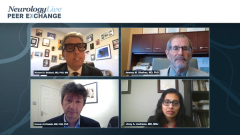
Genetic Testing for Patients with ALS
Experts in neurology give insight into recent advancements in genetic testing for amyotrophic lateral sclerosis (ALS) and discuss what factors to consider when offering it to patients.
Episodes in this series

Richard S. Bedlack, MD, PhD, MS: This is the question that comes up a lot in my clinic, Jinsy: after we have the conversation about the diagnosis and talk a bit about the variability in prognosis, people want to know whether they should get genetic testing. What are your thoughts on that?
Jinsy A. Andrews, MD, MSc: I have to say that I have been seeing patients with ALS [amyotrophic lateral sclerosis] for the past 15 years. In that time alone, my idea of offering genetic testing has changed dramatically, and for many reasons that Ammar talked about earlier, with the availability of gene therapy clinical trials. In the clinic, when we talk about ALS in a newly diagnosed person, we of course offer a review of the FDA approved treatments for ALS. We then talk about management of their symptoms, but we also talk about genetic testing right at the get-go, right at the start of the journey. The reasons are many, but one that was already highlighted in our discussion is that about 20% of people may not have a family history of ALS, but they might have some sort of gene that is associated with it, so it is important to do the genetic testing.
The second is that we have clinical trials for specific gene mutations, especially the SOD1 gene and the C9orf72 gene, that are in human clinical trials as we speak, and more are being developed in the pipeline. This also means that the availability of experimental therapies as they move through clinical development is changing our clinical practice. So not only is it about offering genetic testing to people who are diagnosed with ALS early, but it is also dealing with potential family members who are at risk of also carrying that gene mutation and implementing genetic counseling for the individual with ALS and for people at risk. It is no longer a practice where I just interact with 1 individual with ALS. Especially for people who tested positive for a gene, I am now involved with the patient plus their first-degree relatives or extended family who are also at risk.
It becomes a bit more complex, and there are now many genes associated with ALS. There are many genes associated with ALS that are associated with other types of neurodegenerative diseases and even other psychiatric diseases. Genetics is very complex. Ammar can speak more about how complex it is and how many genes we know about, but it is something that we need to implement early in ALS management.
Richard S. Bedlack, MD, PhD, MS: Great.
Jeremy M. Shefner, MD, PhD: I would agree with everything Jinsy said, but I would also add that, in the United States, genetic testing is not uniformly available for free. There are many ALS centers with their own genetic academic interests and their own laboratories that can perform it, but if you ask insurance companies to pay for genetic testing, the response is quite variable. There are programs to provide at least limited genetic testing for free in the United States, but it is still a challenge for many patients in terms of affordability.
Richard S. Bedlack, MD, PhD, MS: Do you offer genetic testing to all your patients? Which genes do you test them for?
Ammar Al-Chalabi, MB, ChB, PhD: We at Motor Neuron Clinic, King’s College London do not offer genetic testing for all our patients routinely, although it is something that we have discussed doing, and some centers are beginning to do it. The reason we do not is because, as Jeremy and Jinsy have said, there is a lot of work involved in deciding which genes to test in which person. It is a complicated thing to discuss, and we only have limited time. What we do is this: we bring people back to discuss those issues in a genetic counseling clinic, and then we offer the genetic testing. Not everybody wants to come back to that clinic, and some people do not want to hear about the genes that might be affected in them for their families. It becomes a complex issue quite quickly, quite easily, but we think about it for every single person.
The people who we are allowed to offer it for are people who are 40 years old or younger and people with a family history, but what counts as a family history varies as well. For example, if you ask different neurologists, some people will count an uncle who is affected or a cousin or an aunt as being a positive family history. Other people will say that, no, it has to be a first-degree relative. Some people will count frontotemporal dementia in a relative as significant, and other people will not. There are a lot of things that determine whether the family history is counted as positive, and of course, the person may not have full knowledge of their family. We do not test everybody, although we should.
I was going to say this: you asked me which genes are tested. We have a set of genes that we can test, but we do them in order. The first 4 genes we test are SOD1, C9orf72, FUS, and TARDBP. The TARDBP gene codes for TDP-43 protein. We then have a panel of 38 further genes that will just be done as a panel. Because whole genome sequencing is now becoming much cheaper, we can get it done for about €150 on Black Friday and for €300 any of the time of the year, for example. I would say that is relatively cheap. It’s cheaper than a lot of the other panel tests. A lot of patients are beginning to get their whole genomes done, but you are then stuck with somebody who has a lot of genetic information and no easy way to mine it because the whole genome is a lot of data, and there is no easy way to be counseled about it.
We have tried to tackle that. We have a service where you can upload your genome, and it will give you an automated report for ALS genes that you could then take to a genetic counselor. This kind of issue is going to become more and more prevalent as genetic testing becomes cheaper and because of the blocks that we have all mentioned to being tested in the clinical setting.
Jinsy A. Andrews, MD, MSc: I would add that it is true that genetic testing is expensive here in the United States, but it is true that the whole genome sequencing is a little cheaper under a research basis. What was surprising for me in practice is that, when we offer the genetic testing, of course the person with ALS is always interested. There was an assumption that the family members may not be interested because we do not have anything that we can do right now. At Columbia University Department of Neurology, we call it the Families Project. It is a research project following asymptomatic carriers or asymptomatic relatives of people who have been diagnosed with gene-associated ALS. Those individuals surprisingly wanted a genetic counselor, so we have a genetic counselor incorporated into our clinic, which makes a big difference. Almost everyone asks for the test after a back-and-forth and discussion. When they are informed, they seem to want to do it, which was a bit surprising for me.
Richard S. Bedlack, MD, PhD, MS: Thank you for watching this NeurologyLive® Peer Exchange. If you enjoyed the content, please subscribe to our e-newsletters to receive upcoming Peer Exchanges and other great content right in your inbox.
Transcript Edited for Clarity
Newsletter
Keep your finger on the pulse of neurology—subscribe to NeurologyLive for expert interviews, new data, and breakthrough treatment updates.

